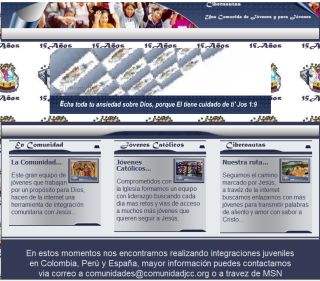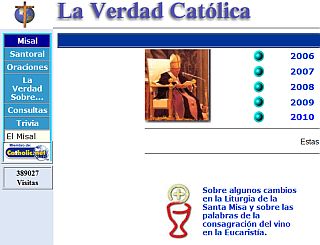
Grupos de católicos comprometidos en no esconder sino al contrario manifestar su fe en Jesús. Click!
Agosto 4: La Pascua de Cristo nos saco del destierro y del pecado
Homilia para el miércoles de la semana No. 18 del Tiempo Ordinario, con una invitacion a confiar plenamente en Cristo
St. Catherine of Siena (03) Self-knowledge: From the Opening Passage in the Dialogue
The soul, who is lifted by a very great and yearning desire for the honor of God and the salvation of souls, begins by exercising herself, for a certain space of time, in the ordinary virtues, remaining in the cell of self-knowledge, in order to know better the goodness of God towards her. This she does because knowledge must precede love, and only when she has attained love, can she strive to follow and to clothe herself with the truth. But, in no way, does the creature receive such a taste of the truth, or so brilliant a light therefrom, as by means of humble and continuous prayer, founded on knowledge of herself and of God; because prayer, exercising her in the above way, unites with God the soul that follows the footprints of Christ Crucified, and thus, by desire and affection, and union of love, makes her another Himself. Christ would seem to have meant this, when He said: To him who will love Me and will observe My commandment, will I manifest Myself; and he shall be one thing with Me and I with him. In several places we find similar words, by which we can see that it is, indeed, through the effect of love, that the soul becomes another Himself.
St. Catherine of Siena (02) Self-knowledge: An Existential and Biblical Presentation
It is neither mere introspection nor psychological analysis. St. Catherine’s view of self-knowledge starts from the decision to seek truth and to reject bias.
What Does Water Stand For You?
Walking accross the lake, Jesus was doing far more than producing amazement and excitement.
Misal on-line: un modo de aprovechar mas la Santa Misa

“Estas páginas te van a ayudar a participar mejor en las Misas…” Click!
Agosto 3: Una fe muy profunda para andar sobre el agua
Homilia para el martes de la semana No. 18 del Tiempo Ordinario, nos invita a revisar nuestra fe
St. Catherine of Siena (01) Introduction
Top ten reasons to better appreciate St. Catherine’s spiritual and doctrinal legacy.
Clash of Prophets
Jeremiah and Hananiah have two very different messages to the people, and both of them claim to have some credentials. How are we to discern between them?
Capilla de la Mansion de Mere-Mallet
Agosto 2: Los verdaderos profetas y los falsos profetas
Homilia para el lunes de la semana No. 18 del Tiempo Ordinario, nos exhorta a identificar a los verdaderos profetas
Soledad y soledades
Hay una soledad buena y necesaria: la que nos lleva a buscar el encuentro sincero, de corazón a corazón, con el Señor. Esta soledad se ve amenazada por el ruido y los múltiples ídolos de nuestro tiempo. Por contraste, en cambio, hay una soledad mala, la propia del egoísmo y de la mirada que sólo sabe desconfiar del prójimo, engendrando dureza en el alma y paranoia y depresión en la mente. Distinguir entre estas soledades, y cómo preservar la primera y no caer en la segunda, es vital. Predicación en la Asociación “María Santificadora.”
Agosto 1: Que es ser rico ante Dios?
Homilia para el domingo No. 18 del Tiempo Ordinario, Ciclo C, con una invitacion a reflexionar sobre la verdadera riqueza

